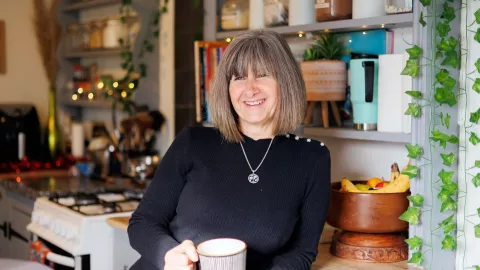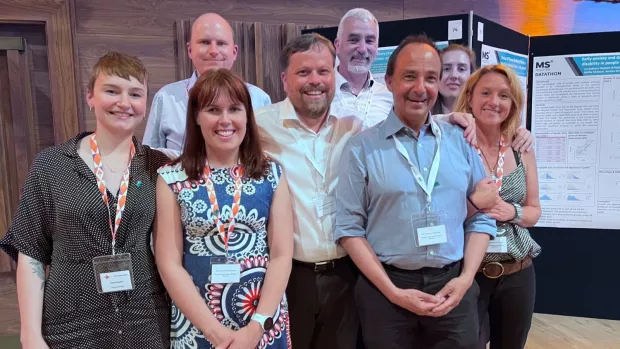
“It’s the most fantastic thing to be part of” – Linnetta and the UK MS Register
Linnetta was diagnosed with relapsing remitting MS in 2007 and she’s one of the longest-running participants in the UK MS Register. We spoke to Linnetta about how it's helped her and the importance of our Stop MS Appeal.
What was your diagnosis journey like?
I was diagnosed at the end of 2007 after developing a tremor. I put it down to anxiety at the time. But I’d also had pain in 2006 which I think was my first symptom.
I went for physio and got sent back to my doctor after my first session. My physiotherapist referred me to a neurologist and that’s when it all kicked off. I had to wait quite a while, but then the MRI scan and lumbar puncture showed I had MS.
How did you feel at the time?
I was very upset and I thought “What do I do now?” My neurologist just gave me my diagnosis and basically told me “That’s it, go away.” I didn’t have anything to read – I had nothing.
I had to wait a year before being given any medication. They asked me to phone in when I had unusual symptoms. And that’s how they monitored my MS for the first year or so. It was a very scary time and I felt like I didn’t want to be here anymore.
I spoke to the MS Society in 2008, which was lovely. They sent me loads of leaflets on how to tell the kids, how to sort myself out – everything, really. I didn’t feel alone after that.
How did you get involved with the UK MS Register?
My MS nurse asked me if I’d like to join when it first opened. She said it’d help me and it has!
Can you tell us how it works?
You’re given new surveys to complete every six months. Once you’ve signed up, they appear on your homepage and they’re all about how MS affects you. So this can be anything from mobility to anxiety or depression. And things like fatigue and cognitive issues.
How has that helped you with your MS?
It’s allowed me to see how my MS has changed over time and it means I can track everything myself. For example, I can look at my data to see if my anxiety or mobility have got better or worse.
I also look at the data with my husband, which he finds really helpful. We’ve learnt to laugh about everything rather than cry, and we accept MS as a part of who I am.
Would you encourage other people to join the UK MS Register?
Definitely, yes. It’s the most fantastic thing to be part of. It feels amazing to be involved in scientific research. And if everyone with MS joins it, we can learn more about the condition and how it changes. And hopefully this’ll help people in the future.
What would you like to see in the future with MS care and treatments?
I’d like there to be more MS nurses so it's easier to have contact. I’d also like GPs to have more knowledge about the condition. And making treatments available for everyone without a postcode lottery would be great.
What are your hopes for the future of MS research?
I want researchers to find a cure for MS. I want to be able to play with my grandkids without gripping or balance issues. I’d also love to go and do what I want, when I want, and live life to the fullest without anxiety.
Why should people donate to stop MS?
People should donate to help find new treatments that could transform people's lives forever. I hope one day we find a cure. That will be the best day ever.
Get support
Our MS Helpline gives emotional support to anyone affected by MS. Call 0808 800 8000 for free or email [email protected]. We’re here Monday to Friday, 9am to 7pm except bank holidays.
For emotional support 24 hours a day, you can also call Samaritans on 116 123.





